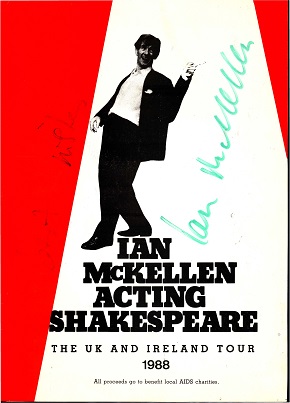In May 1988, the actor Ian McKellen brought his one-man play, Acting Shakespeare, to Dublin as part of a UK and Ireland tour as a fundraiser for local AIDS charities. Initially performed at the National Theatre in London, McKellen packed the Abbey Theatre in Dublin for two sell-out and rapturously received performances of his miscellany of Shakespearean shorts and excerpts. The Abbey production was initiated by a teacher at Sutton Park School, Sharon Hogan, who after seeing the play in London and with a group of students, led fundraising to make the production happen in Dublin. McKellen performing Shakespeare at the Abbey raised £30,000 for Irish AIDS charities.
Looking at the depiction of illness, contagion, and disease in modern Irish drama allows us to reflect on how and when virus outbreaks and pandemics have been previously considered within society. It also allows us to consider the experiences of those who were ill or considered infected and their subsequent treatment by others, which may have resulted in stigma and social isolation. A study of the performance of viral illness is also to study social empathy, medical awareness and the impact of stigma in Ireland. But do we always empathise with those who are made ill? Or are we fearful of those who are contagious? From ‘herd immunity’ to ‘herd mentality’, there is a chequered history of the study of viral performance in Irish theatre.
Every theatre-goer who went to the Abbey Theatre, for example, over fifty years from the 1910s through to the 1960s, and who read their play programme saw the warning (or reassurance) that “In the interest of public health the theatre is disinfected with Jeyes Fluid and sprayed with Jeyes floral spray.” In decades where Dublin recorded some of the highest poverty levels and large-scale slum inhabitants internationally, as well through later decades of T.B. outbreaks, there was obviously a need, if even to just psychologically reassure patrons, the theatre was clean and sanitised.

Published: 31 Mar 2020 Categories: Critical Theory, Cultural Studies, English Literature, Literary Theory, Medicine, Covid-19 and the Humanities

